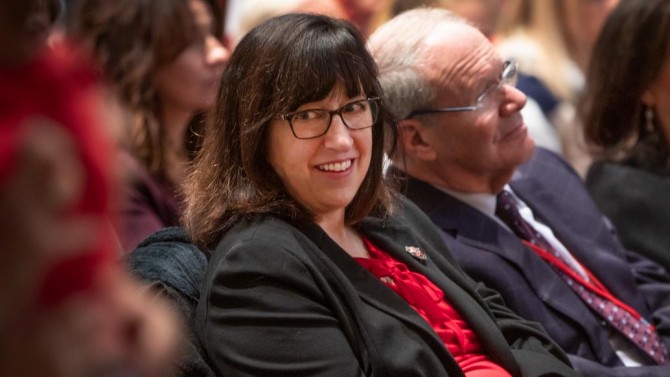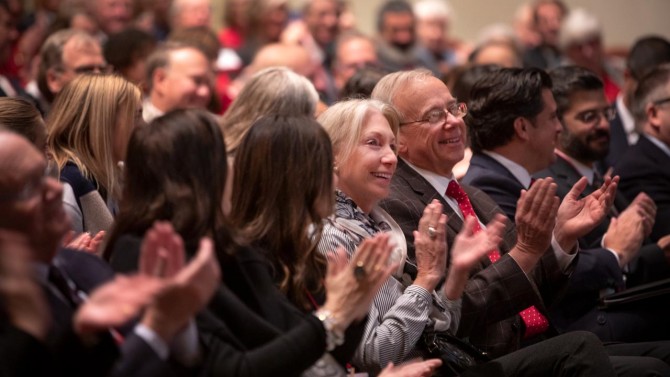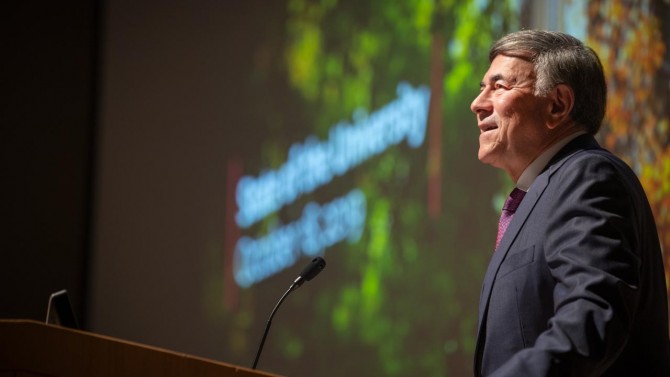Cornellians provide ‘greatest good’ return on investment
By Joe Wilensky
The ongoing challenges we face as a society are social and technical, and demand both expertise and humanity – and they require the kind of education and knowledge that Cornellians strive for, said Cornell President Martha E. Pollack during her State of the University Address Oct. 18.
The annual address – delivered in Statler Auditorium to nearly 700 trustees, Cornell University Council members, alumni, faculty, staff, students and guests (plus livestream viewers) – was part of Trustee-Council Annual Meeting events held in Ithaca Oct. 16-19.
Cornell University was founded not only as a legacy but as an investment, Pollack said, noting that university founder Ezra Cornell was “seeking a very specific return – he was looking to do the greatest good with his fortune, and he was looking to do it for posterity.”
Describing letters and writings both by Ezra Cornell and by the university’s first president, Andrew Dickson White, in the months leading up to the university’s establishment in 1865, Pollack said, “It’s striking how many of the concerns that occupy us now as a society were at the forefront of their minds then.” Divisions within society, inequality of opportunity, racism and closed-mindedness, and the devaluation of truth all were topics of discussion.
Today, 154 years later, “Ezra Cornell would have found some of our challenges as a society very familiar – and some unimaginable,” she said. And the knowledge and tools that a Cornell education provides in response are geared toward doing “the greatest good not just for each individual student, but for the communities and societies that they live in, lead and serve.”
Pollack gave a vivid and detailed progress report on the four priorities she has advanced as central to the university’s mission and success: academic distinction, educational verve, civic responsibility and “One Cornell.”
Academic excellence and distinction are “our bedrock,” she said. “Everything we do, everything we achieve, stands on our world-class academics.” She listed a plethora of faculty distinctions over the past year, including two inductees to the National Academy of Sciences, two inductees to the American Academy of Arts and Sciences; four Presidential Early Career Awards for Scientists and Engineers; and one Windham-Campbell Prize in Literature.
She spotlighted the Departments of Computational Biology and Statistics and Data Science, the new Institute of Politics and Global Affairs in New York City, the new Center for Social Sciences in Ithaca and more – which she said are “all committed to bringing together different areas of human knowledge in pursuit of understanding that does not lie along traditional paths.”
Externally funded faculty research is up 7% this year, and in entrepreneurship, Cornell undergraduate programs have since 2006 produced 796 founders of 735 companies, cumulatively raising more than $23.8 billion.
“I see the research enterprise at Cornell as core not only to our academic distinction, but also to our larger mission of doing the most good – in all areas of human life and endeavor,” Pollack said.
The Active Learning Initiative and Engaged Cornell programs continue to grow, she said, making educational verve at Cornell thrive and touching thousands of students each year.
Civic responsibility, Pollack said, refers not only to the university’s responsibility to educate and produce engaged global citizens, but to also to its responsibility to be a good institutional citizen, “acting responsibly in the context of our community, our nation and our world,” she said. She highlighted the breadth and diversity of Cornell’s newest entering class, the Class of 2023, but noted that “it’s not enough just to admit a diverse student body; we must also support them.”
Thanks to the generosity of many alumni, combined with a strong institutional commitment, Cornell continues to meet the full financial need of every admitted domestic student, Pollack said, and more aid continues to move away from loans and into grants (last year, $257 million in grants was awarded). “We know that we still need to do more, both to hold the line on the cost of attending Cornell, and to increase the socio-economic diversity of our student body,” she said.
Pollack lauded the recent announcement of Weill Cornell Medicine’s program to eliminate new debt for all medical students qualifying for financial aid and thanked everyone who made it possible, saying it will allow students “to choose their paths based on where they can do the most good, and not on whether they’ll be able to pay back their loans.”
She gave an update on the recommendations of the Presidential Task Force on Campus Climate, two-thirds of which have already been put into practice, including the development of a statement of Cornell’s core values.
That statement describes and reaffirms Cornell’s values of purposeful discovery; free and open inquiry and expression; a community of belonging; exploration across boundaries; changing lives through public engagement; and respect for the natural environment.
“People ask me, ‘What are you going to do with that statement when you have it?’” Pollack said, “And my answer is simple: ‘I’m going to use it, and I hope you will, too.’ It’s there to be used – both as a tool to explain the Cornell ethos to new members of our community, and as a benchmark against which to make those tough decisions that we face as leaders and as Cornellians,” she said.
The university’s ongoing work toward “One Cornell” – capitalizing on the strengths within and across Cornell’s campuses – continues to ensure that the whole is more than the sum of its parts, Pollack said. As examples, she cited the continuing growth and impact of Cornell Tech (as well as the College of Arts and Sciences students in the Milstein Program in Technology and Humanity who will spend next summer at Cornell Tech), the new university hub at 570 Lexington Ave. in New York City, and how university researchers are being increasingly tapped for their expertise in multiple areas and fields.
For generations, Cornell has welcomed students “into a community of learning and scholarship like no other,” Pollack said, teaching them, challenging them, awakening them and engaging them. They have subsequently gone out into the world with not just knowledge, “but also the understanding, curiosity and flexibility of mind to seek truth wherever it may lie, and to put that truth to work.”
Media Contact
Get Cornell news delivered right to your inbox.
Subscribe



